Impact of Small Businesses on UK Economy after Brexit
VerifiedAdded on 2020/11/12
|15
|4201
|137
AI Summary
The report explores the significance of SMEs in the UK economy, highlighting their contribution to social economy growth after Brexit. It also delves into aspects of entrepreneurial personality and discusses the challenges faced by SMEs due to Brexit.
Contribute Materials
Your contribution can guide someone’s learning journey. Share your
documents today.

UNIT 9
ENTREPRENEURSHIP
ENTREPRENEURSHIP
Secure Best Marks with AI Grader
Need help grading? Try our AI Grader for instant feedback on your assignments.
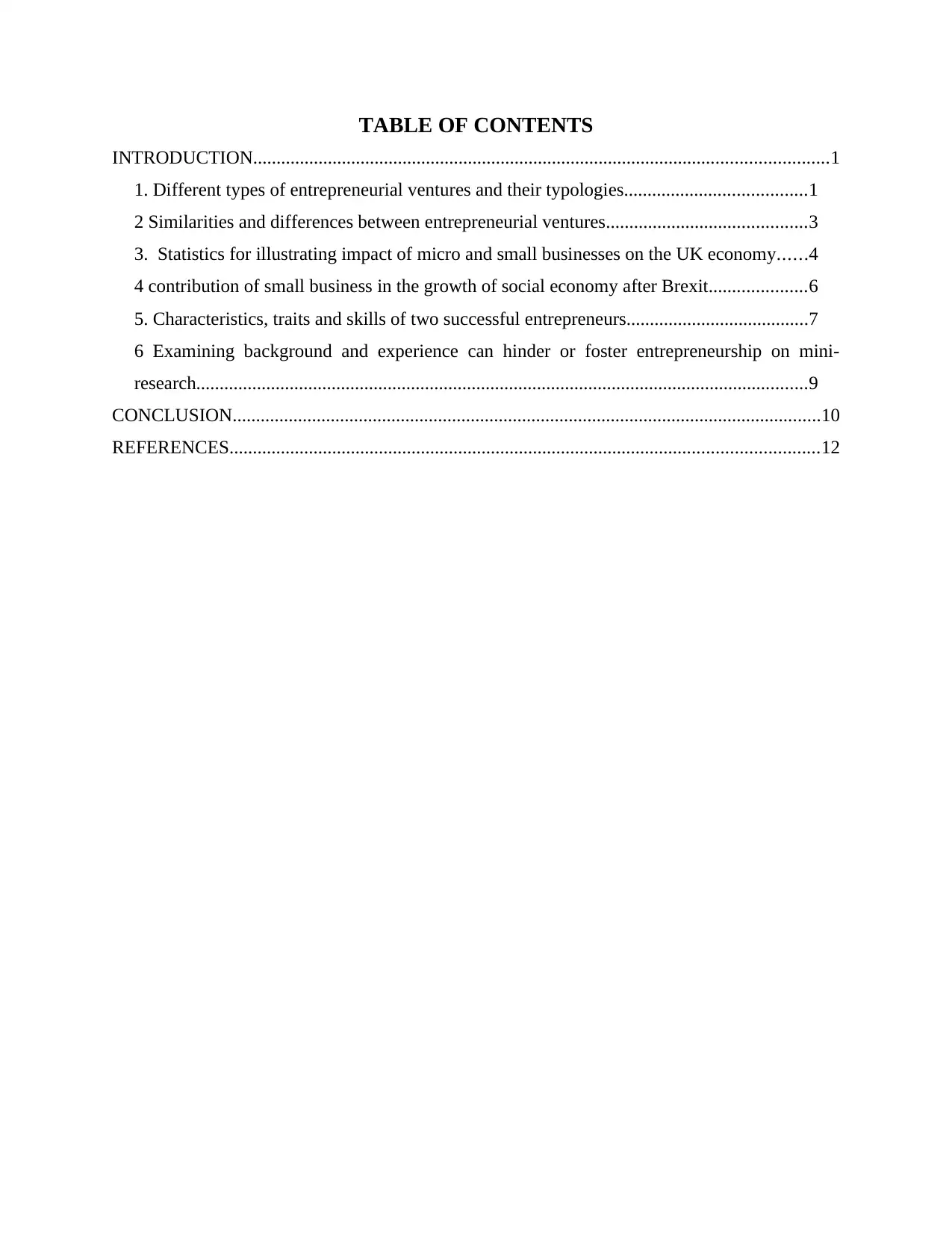
TABLE OF CONTENTS
INTRODUCTION...........................................................................................................................1
1. Different types of entrepreneurial ventures and their typologies.......................................1
2 Similarities and differences between entrepreneurial ventures...........................................3
3. Statistics for illustrating impact of micro and small businesses on the UK economy......4
4 contribution of small business in the growth of social economy after Brexit.....................6
5. Characteristics, traits and skills of two successful entrepreneurs.......................................7
6 Examining background and experience can hinder or foster entrepreneurship on mini-
research...................................................................................................................................9
CONCLUSION..............................................................................................................................10
REFERENCES..............................................................................................................................12
INTRODUCTION...........................................................................................................................1
1. Different types of entrepreneurial ventures and their typologies.......................................1
2 Similarities and differences between entrepreneurial ventures...........................................3
3. Statistics for illustrating impact of micro and small businesses on the UK economy......4
4 contribution of small business in the growth of social economy after Brexit.....................6
5. Characteristics, traits and skills of two successful entrepreneurs.......................................7
6 Examining background and experience can hinder or foster entrepreneurship on mini-
research...................................................................................................................................9
CONCLUSION..............................................................................................................................10
REFERENCES..............................................................................................................................12
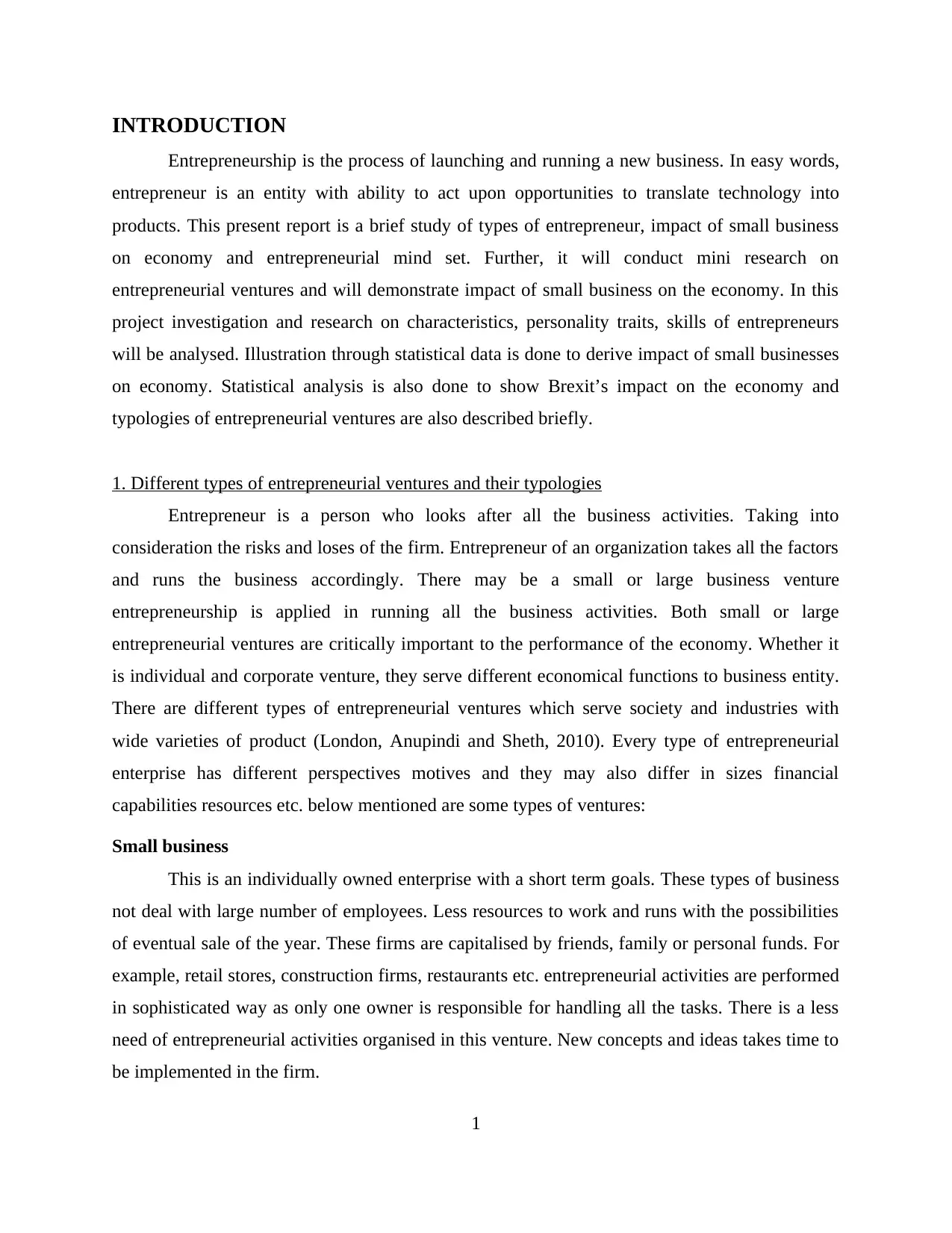
INTRODUCTION
Entrepreneurship is the process of launching and running a new business. In easy words,
entrepreneur is an entity with ability to act upon opportunities to translate technology into
products. This present report is a brief study of types of entrepreneur, impact of small business
on economy and entrepreneurial mind set. Further, it will conduct mini research on
entrepreneurial ventures and will demonstrate impact of small business on the economy. In this
project investigation and research on characteristics, personality traits, skills of entrepreneurs
will be analysed. Illustration through statistical data is done to derive impact of small businesses
on economy. Statistical analysis is also done to show Brexit’s impact on the economy and
typologies of entrepreneurial ventures are also described briefly.
1. Different types of entrepreneurial ventures and their typologies
Entrepreneur is a person who looks after all the business activities. Taking into
consideration the risks and loses of the firm. Entrepreneur of an organization takes all the factors
and runs the business accordingly. There may be a small or large business venture
entrepreneurship is applied in running all the business activities. Both small or large
entrepreneurial ventures are critically important to the performance of the economy. Whether it
is individual and corporate venture, they serve different economical functions to business entity.
There are different types of entrepreneurial ventures which serve society and industries with
wide varieties of product (London, Anupindi and Sheth, 2010). Every type of entrepreneurial
enterprise has different perspectives motives and they may also differ in sizes financial
capabilities resources etc. below mentioned are some types of ventures:
Small business
This is an individually owned enterprise with a short term goals. These types of business
not deal with large number of employees. Less resources to work and runs with the possibilities
of eventual sale of the year. These firms are capitalised by friends, family or personal funds. For
example, retail stores, construction firms, restaurants etc. entrepreneurial activities are performed
in sophisticated way as only one owner is responsible for handling all the tasks. There is a less
need of entrepreneurial activities organised in this venture. New concepts and ideas takes time to
be implemented in the firm.
1
Entrepreneurship is the process of launching and running a new business. In easy words,
entrepreneur is an entity with ability to act upon opportunities to translate technology into
products. This present report is a brief study of types of entrepreneur, impact of small business
on economy and entrepreneurial mind set. Further, it will conduct mini research on
entrepreneurial ventures and will demonstrate impact of small business on the economy. In this
project investigation and research on characteristics, personality traits, skills of entrepreneurs
will be analysed. Illustration through statistical data is done to derive impact of small businesses
on economy. Statistical analysis is also done to show Brexit’s impact on the economy and
typologies of entrepreneurial ventures are also described briefly.
1. Different types of entrepreneurial ventures and their typologies
Entrepreneur is a person who looks after all the business activities. Taking into
consideration the risks and loses of the firm. Entrepreneur of an organization takes all the factors
and runs the business accordingly. There may be a small or large business venture
entrepreneurship is applied in running all the business activities. Both small or large
entrepreneurial ventures are critically important to the performance of the economy. Whether it
is individual and corporate venture, they serve different economical functions to business entity.
There are different types of entrepreneurial ventures which serve society and industries with
wide varieties of product (London, Anupindi and Sheth, 2010). Every type of entrepreneurial
enterprise has different perspectives motives and they may also differ in sizes financial
capabilities resources etc. below mentioned are some types of ventures:
Small business
This is an individually owned enterprise with a short term goals. These types of business
not deal with large number of employees. Less resources to work and runs with the possibilities
of eventual sale of the year. These firms are capitalised by friends, family or personal funds. For
example, retail stores, construction firms, restaurants etc. entrepreneurial activities are performed
in sophisticated way as only one owner is responsible for handling all the tasks. There is a less
need of entrepreneurial activities organised in this venture. New concepts and ideas takes time to
be implemented in the firm.
1
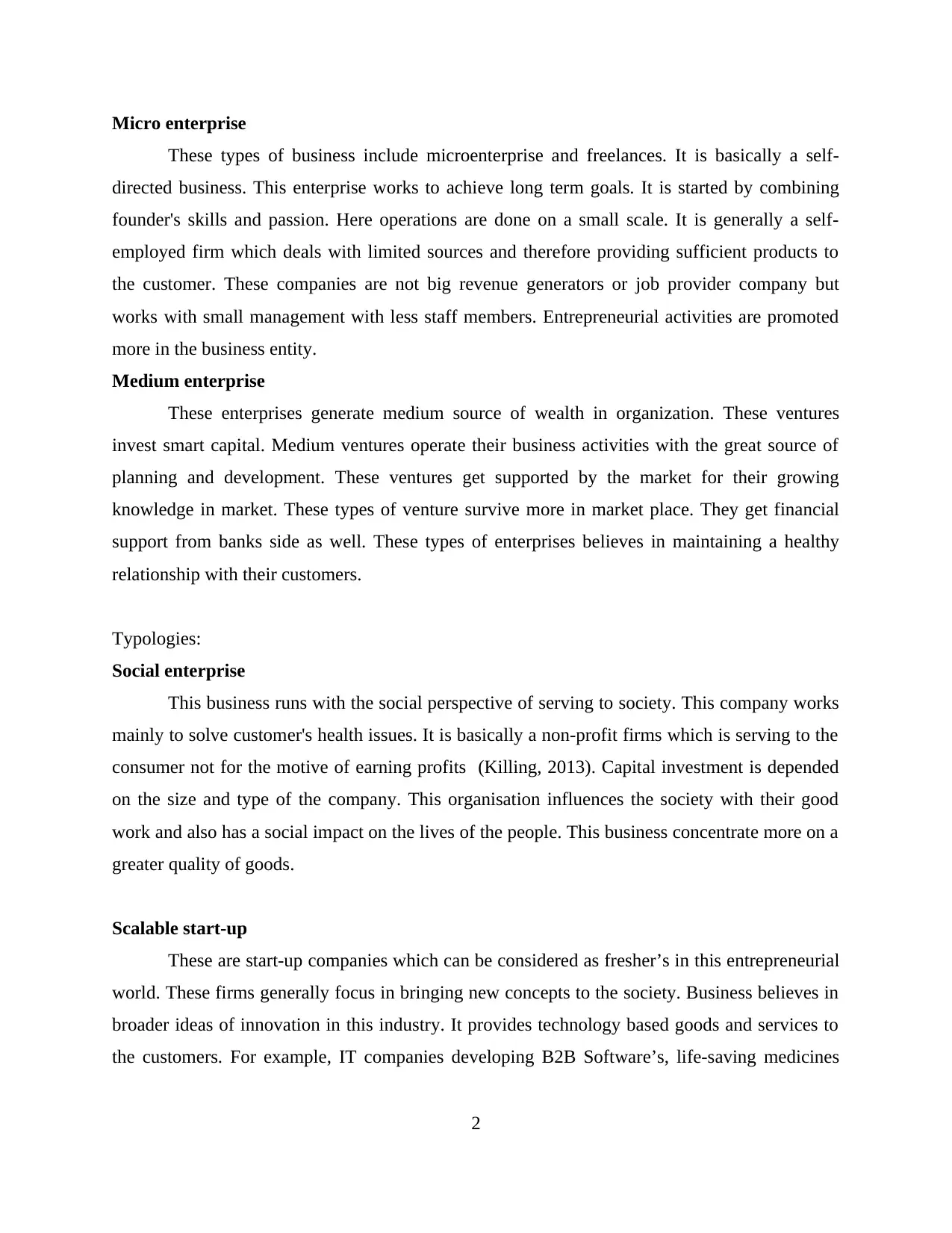
Micro enterprise
These types of business include microenterprise and freelances. It is basically a self-
directed business. This enterprise works to achieve long term goals. It is started by combining
founder's skills and passion. Here operations are done on a small scale. It is generally a self-
employed firm which deals with limited sources and therefore providing sufficient products to
the customer. These companies are not big revenue generators or job provider company but
works with small management with less staff members. Entrepreneurial activities are promoted
more in the business entity.
Medium enterprise
These enterprises generate medium source of wealth in organization. These ventures
invest smart capital. Medium ventures operate their business activities with the great source of
planning and development. These ventures get supported by the market for their growing
knowledge in market. These types of venture survive more in market place. They get financial
support from banks side as well. These types of enterprises believes in maintaining a healthy
relationship with their customers.
Typologies:
Social enterprise
This business runs with the social perspective of serving to society. This company works
mainly to solve customer's health issues. It is basically a non-profit firms which is serving to the
consumer not for the motive of earning profits (Killing, 2013). Capital investment is depended
on the size and type of the company. This organisation influences the society with their good
work and also has a social impact on the lives of the people. This business concentrate more on a
greater quality of goods.
Scalable start-up
These are start-up companies which can be considered as fresher’s in this entrepreneurial
world. These firms generally focus in bringing new concepts to the society. Business believes in
broader ideas of innovation in this industry. It provides technology based goods and services to
the customers. For example, IT companies developing B2B Software’s, life-saving medicines
2
These types of business include microenterprise and freelances. It is basically a self-
directed business. This enterprise works to achieve long term goals. It is started by combining
founder's skills and passion. Here operations are done on a small scale. It is generally a self-
employed firm which deals with limited sources and therefore providing sufficient products to
the customer. These companies are not big revenue generators or job provider company but
works with small management with less staff members. Entrepreneurial activities are promoted
more in the business entity.
Medium enterprise
These enterprises generate medium source of wealth in organization. These ventures
invest smart capital. Medium ventures operate their business activities with the great source of
planning and development. These ventures get supported by the market for their growing
knowledge in market. These types of venture survive more in market place. They get financial
support from banks side as well. These types of enterprises believes in maintaining a healthy
relationship with their customers.
Typologies:
Social enterprise
This business runs with the social perspective of serving to society. This company works
mainly to solve customer's health issues. It is basically a non-profit firms which is serving to the
consumer not for the motive of earning profits (Killing, 2013). Capital investment is depended
on the size and type of the company. This organisation influences the society with their good
work and also has a social impact on the lives of the people. This business concentrate more on a
greater quality of goods.
Scalable start-up
These are start-up companies which can be considered as fresher’s in this entrepreneurial
world. These firms generally focus in bringing new concepts to the society. Business believes in
broader ideas of innovation in this industry. It provides technology based goods and services to
the customers. For example, IT companies developing B2B Software’s, life-saving medicines
2
Secure Best Marks with AI Grader
Need help grading? Try our AI Grader for instant feedback on your assignments.
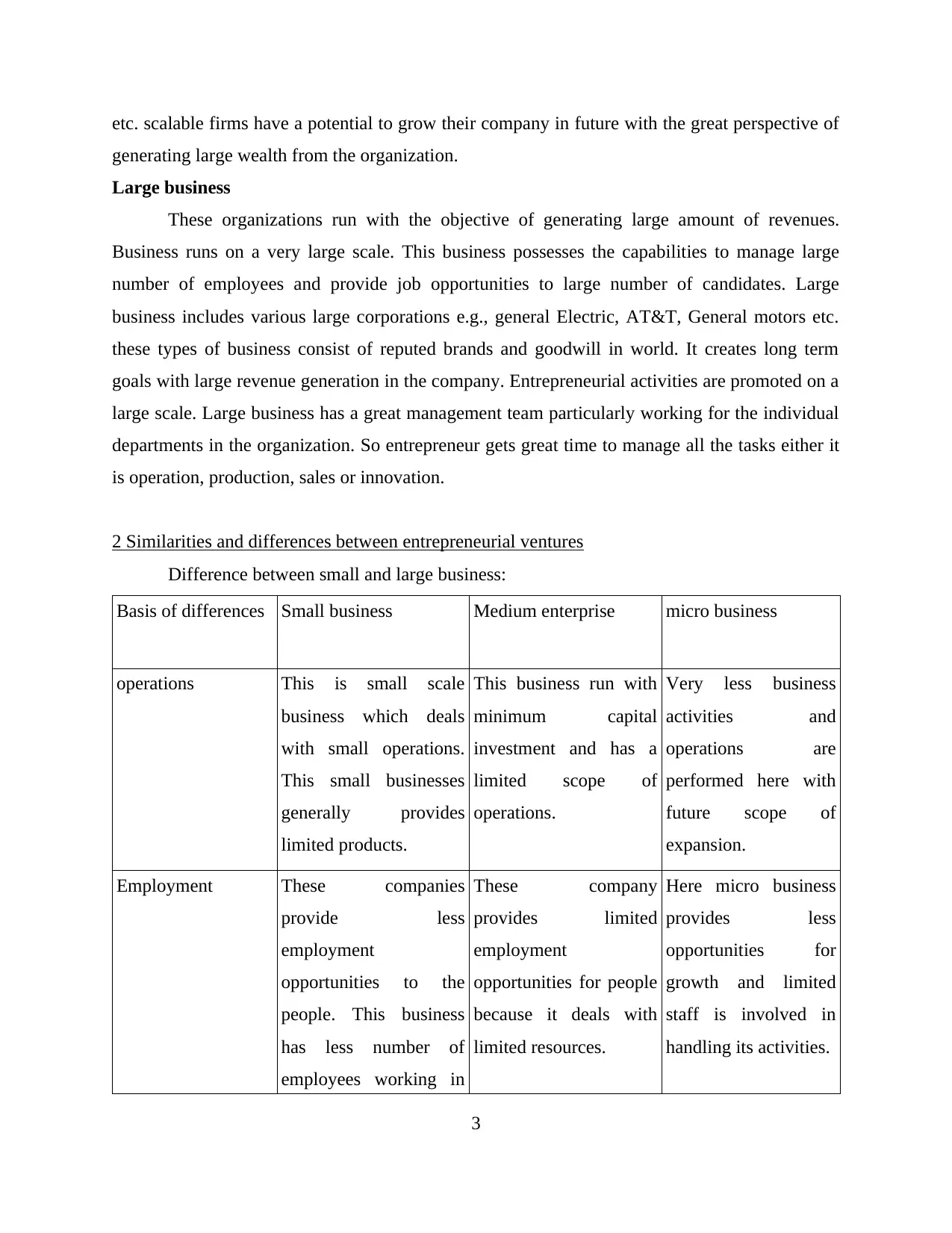
etc. scalable firms have a potential to grow their company in future with the great perspective of
generating large wealth from the organization.
Large business
These organizations run with the objective of generating large amount of revenues.
Business runs on a very large scale. This business possesses the capabilities to manage large
number of employees and provide job opportunities to large number of candidates. Large
business includes various large corporations e.g., general Electric, AT&T, General motors etc.
these types of business consist of reputed brands and goodwill in world. It creates long term
goals with large revenue generation in the company. Entrepreneurial activities are promoted on a
large scale. Large business has a great management team particularly working for the individual
departments in the organization. So entrepreneur gets great time to manage all the tasks either it
is operation, production, sales or innovation.
2 Similarities and differences between entrepreneurial ventures
Difference between small and large business:
Basis of differences Small business Medium enterprise micro business
operations This is small scale
business which deals
with small operations.
This small businesses
generally provides
limited products.
This business run with
minimum capital
investment and has a
limited scope of
operations.
Very less business
activities and
operations are
performed here with
future scope of
expansion.
Employment These companies
provide less
employment
opportunities to the
people. This business
has less number of
employees working in
These company
provides limited
employment
opportunities for people
because it deals with
limited resources.
Here micro business
provides less
opportunities for
growth and limited
staff is involved in
handling its activities.
3
generating large wealth from the organization.
Large business
These organizations run with the objective of generating large amount of revenues.
Business runs on a very large scale. This business possesses the capabilities to manage large
number of employees and provide job opportunities to large number of candidates. Large
business includes various large corporations e.g., general Electric, AT&T, General motors etc.
these types of business consist of reputed brands and goodwill in world. It creates long term
goals with large revenue generation in the company. Entrepreneurial activities are promoted on a
large scale. Large business has a great management team particularly working for the individual
departments in the organization. So entrepreneur gets great time to manage all the tasks either it
is operation, production, sales or innovation.
2 Similarities and differences between entrepreneurial ventures
Difference between small and large business:
Basis of differences Small business Medium enterprise micro business
operations This is small scale
business which deals
with small operations.
This small businesses
generally provides
limited products.
This business run with
minimum capital
investment and has a
limited scope of
operations.
Very less business
activities and
operations are
performed here with
future scope of
expansion.
Employment These companies
provide less
employment
opportunities to the
people. This business
has less number of
employees working in
These company
provides limited
employment
opportunities for people
because it deals with
limited resources.
Here micro business
provides less
opportunities for
growth and limited
staff is involved in
handling its activities.
3
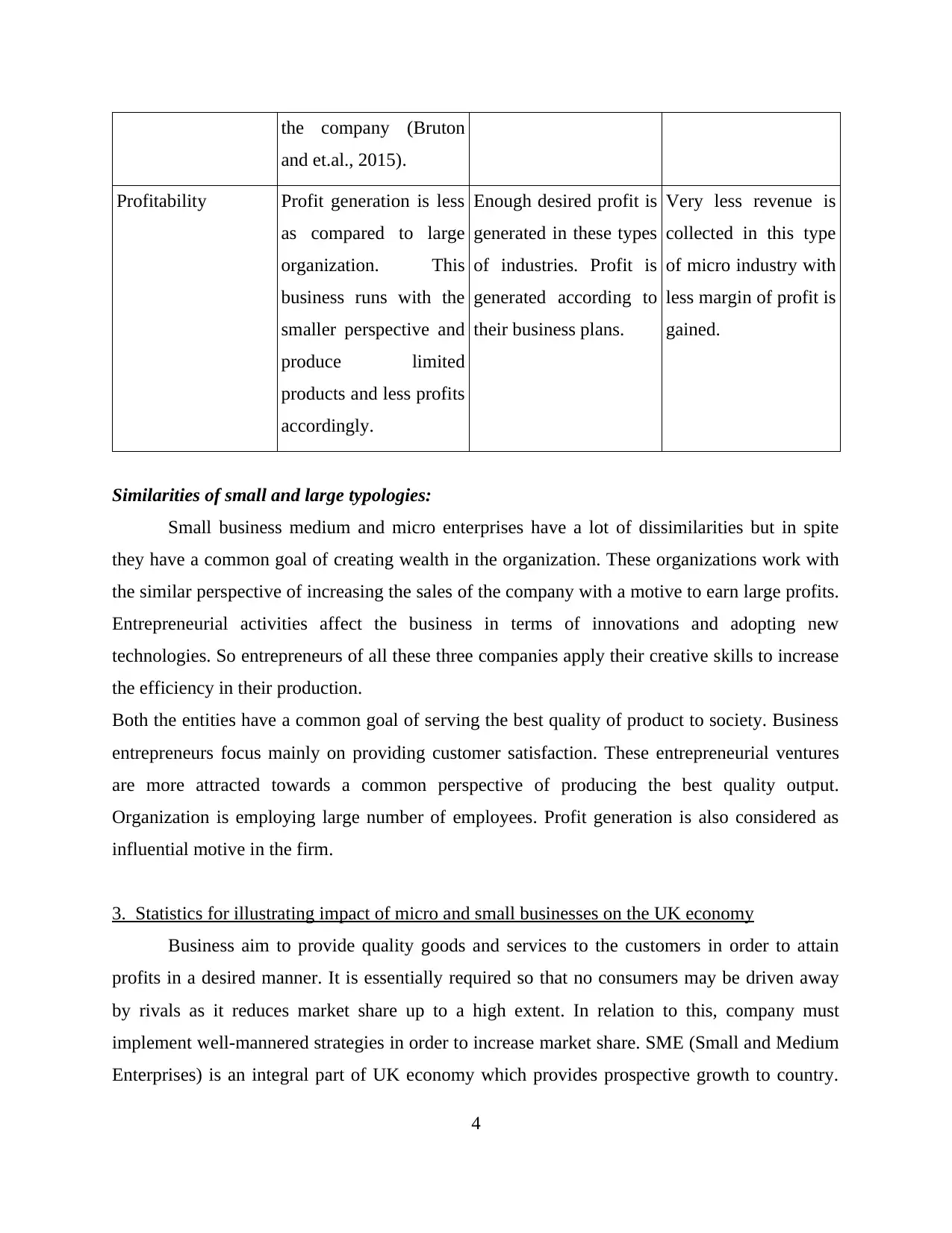
the company (Bruton
and et.al., 2015).
Profitability Profit generation is less
as compared to large
organization. This
business runs with the
smaller perspective and
produce limited
products and less profits
accordingly.
Enough desired profit is
generated in these types
of industries. Profit is
generated according to
their business plans.
Very less revenue is
collected in this type
of micro industry with
less margin of profit is
gained.
Similarities of small and large typologies:
Small business medium and micro enterprises have a lot of dissimilarities but in spite
they have a common goal of creating wealth in the organization. These organizations work with
the similar perspective of increasing the sales of the company with a motive to earn large profits.
Entrepreneurial activities affect the business in terms of innovations and adopting new
technologies. So entrepreneurs of all these three companies apply their creative skills to increase
the efficiency in their production.
Both the entities have a common goal of serving the best quality of product to society. Business
entrepreneurs focus mainly on providing customer satisfaction. These entrepreneurial ventures
are more attracted towards a common perspective of producing the best quality output.
Organization is employing large number of employees. Profit generation is also considered as
influential motive in the firm.
3. Statistics for illustrating impact of micro and small businesses on the UK economy
Business aim to provide quality goods and services to the customers in order to attain
profits in a desired manner. It is essentially required so that no consumers may be driven away
by rivals as it reduces market share up to a high extent. In relation to this, company must
implement well-mannered strategies in order to increase market share. SME (Small and Medium
Enterprises) is an integral part of UK economy which provides prospective growth to country.
4
and et.al., 2015).
Profitability Profit generation is less
as compared to large
organization. This
business runs with the
smaller perspective and
produce limited
products and less profits
accordingly.
Enough desired profit is
generated in these types
of industries. Profit is
generated according to
their business plans.
Very less revenue is
collected in this type
of micro industry with
less margin of profit is
gained.
Similarities of small and large typologies:
Small business medium and micro enterprises have a lot of dissimilarities but in spite
they have a common goal of creating wealth in the organization. These organizations work with
the similar perspective of increasing the sales of the company with a motive to earn large profits.
Entrepreneurial activities affect the business in terms of innovations and adopting new
technologies. So entrepreneurs of all these three companies apply their creative skills to increase
the efficiency in their production.
Both the entities have a common goal of serving the best quality of product to society. Business
entrepreneurs focus mainly on providing customer satisfaction. These entrepreneurial ventures
are more attracted towards a common perspective of producing the best quality output.
Organization is employing large number of employees. Profit generation is also considered as
influential motive in the firm.
3. Statistics for illustrating impact of micro and small businesses on the UK economy
Business aim to provide quality goods and services to the customers in order to attain
profits in a desired manner. It is essentially required so that no consumers may be driven away
by rivals as it reduces market share up to a high extent. In relation to this, company must
implement well-mannered strategies in order to increase market share. SME (Small and Medium
Enterprises) is an integral part of UK economy which provides prospective growth to country.
4
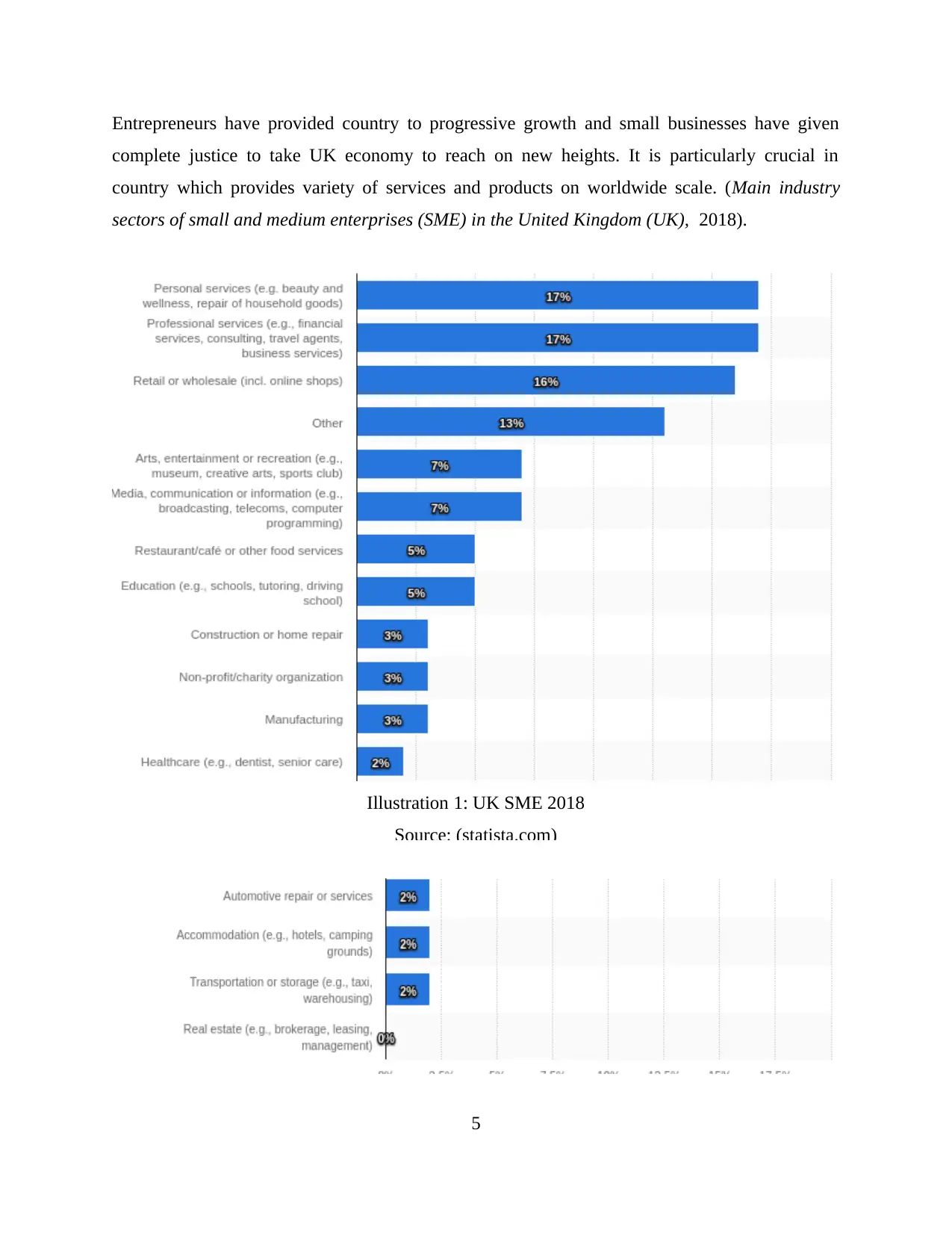
Entrepreneurs have provided country to progressive growth and small businesses have given
complete justice to take UK economy to reach on new heights. It is particularly crucial in
country which provides variety of services and products on worldwide scale. (Main industry
sectors of small and medium enterprises (SME) in the United Kingdom (UK), 2018).
Illustration 1: UK SME 2018
Source: (statista.com)
5
complete justice to take UK economy to reach on new heights. It is particularly crucial in
country which provides variety of services and products on worldwide scale. (Main industry
sectors of small and medium enterprises (SME) in the United Kingdom (UK), 2018).
Illustration 1: UK SME 2018
Source: (statista.com)
5
Paraphrase This Document
Need a fresh take? Get an instant paraphrase of this document with our AI Paraphraser
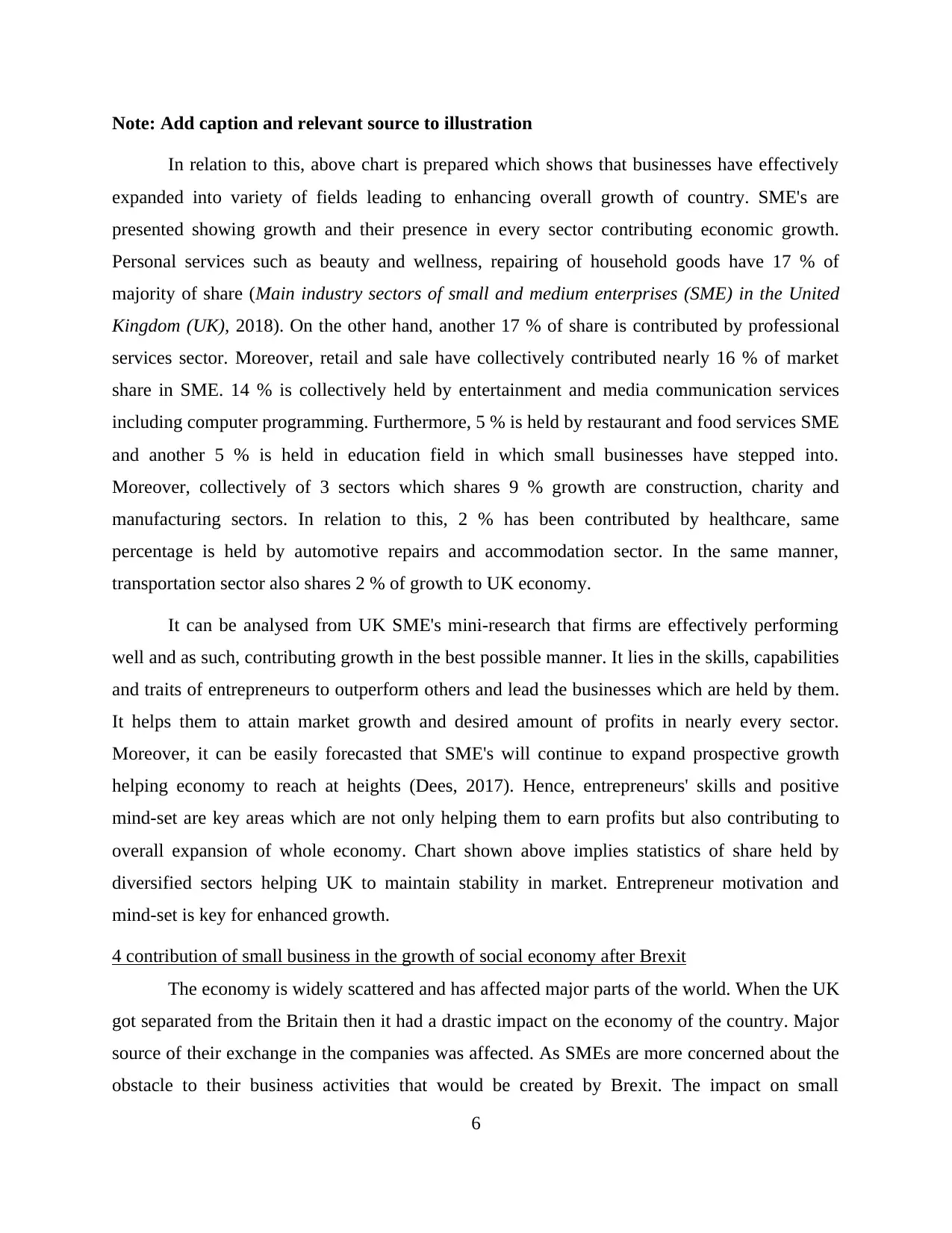
Note: Add caption and relevant source to illustration
In relation to this, above chart is prepared which shows that businesses have effectively
expanded into variety of fields leading to enhancing overall growth of country. SME's are
presented showing growth and their presence in every sector contributing economic growth.
Personal services such as beauty and wellness, repairing of household goods have 17 % of
majority of share (Main industry sectors of small and medium enterprises (SME) in the United
Kingdom (UK), 2018). On the other hand, another 17 % of share is contributed by professional
services sector. Moreover, retail and sale have collectively contributed nearly 16 % of market
share in SME. 14 % is collectively held by entertainment and media communication services
including computer programming. Furthermore, 5 % is held by restaurant and food services SME
and another 5 % is held in education field in which small businesses have stepped into.
Moreover, collectively of 3 sectors which shares 9 % growth are construction, charity and
manufacturing sectors. In relation to this, 2 % has been contributed by healthcare, same
percentage is held by automotive repairs and accommodation sector. In the same manner,
transportation sector also shares 2 % of growth to UK economy.
It can be analysed from UK SME's mini-research that firms are effectively performing
well and as such, contributing growth in the best possible manner. It lies in the skills, capabilities
and traits of entrepreneurs to outperform others and lead the businesses which are held by them.
It helps them to attain market growth and desired amount of profits in nearly every sector.
Moreover, it can be easily forecasted that SME's will continue to expand prospective growth
helping economy to reach at heights (Dees, 2017). Hence, entrepreneurs' skills and positive
mind-set are key areas which are not only helping them to earn profits but also contributing to
overall expansion of whole economy. Chart shown above implies statistics of share held by
diversified sectors helping UK to maintain stability in market. Entrepreneur motivation and
mind-set is key for enhanced growth.
4 contribution of small business in the growth of social economy after Brexit
The economy is widely scattered and has affected major parts of the world. When the UK
got separated from the Britain then it had a drastic impact on the economy of the country. Major
source of their exchange in the companies was affected. As SMEs are more concerned about the
obstacle to their business activities that would be created by Brexit. The impact on small
6
In relation to this, above chart is prepared which shows that businesses have effectively
expanded into variety of fields leading to enhancing overall growth of country. SME's are
presented showing growth and their presence in every sector contributing economic growth.
Personal services such as beauty and wellness, repairing of household goods have 17 % of
majority of share (Main industry sectors of small and medium enterprises (SME) in the United
Kingdom (UK), 2018). On the other hand, another 17 % of share is contributed by professional
services sector. Moreover, retail and sale have collectively contributed nearly 16 % of market
share in SME. 14 % is collectively held by entertainment and media communication services
including computer programming. Furthermore, 5 % is held by restaurant and food services SME
and another 5 % is held in education field in which small businesses have stepped into.
Moreover, collectively of 3 sectors which shares 9 % growth are construction, charity and
manufacturing sectors. In relation to this, 2 % has been contributed by healthcare, same
percentage is held by automotive repairs and accommodation sector. In the same manner,
transportation sector also shares 2 % of growth to UK economy.
It can be analysed from UK SME's mini-research that firms are effectively performing
well and as such, contributing growth in the best possible manner. It lies in the skills, capabilities
and traits of entrepreneurs to outperform others and lead the businesses which are held by them.
It helps them to attain market growth and desired amount of profits in nearly every sector.
Moreover, it can be easily forecasted that SME's will continue to expand prospective growth
helping economy to reach at heights (Dees, 2017). Hence, entrepreneurs' skills and positive
mind-set are key areas which are not only helping them to earn profits but also contributing to
overall expansion of whole economy. Chart shown above implies statistics of share held by
diversified sectors helping UK to maintain stability in market. Entrepreneur motivation and
mind-set is key for enhanced growth.
4 contribution of small business in the growth of social economy after Brexit
The economy is widely scattered and has affected major parts of the world. When the UK
got separated from the Britain then it had a drastic impact on the economy of the country. Major
source of their exchange in the companies was affected. As SMEs are more concerned about the
obstacle to their business activities that would be created by Brexit. The impact on small
6
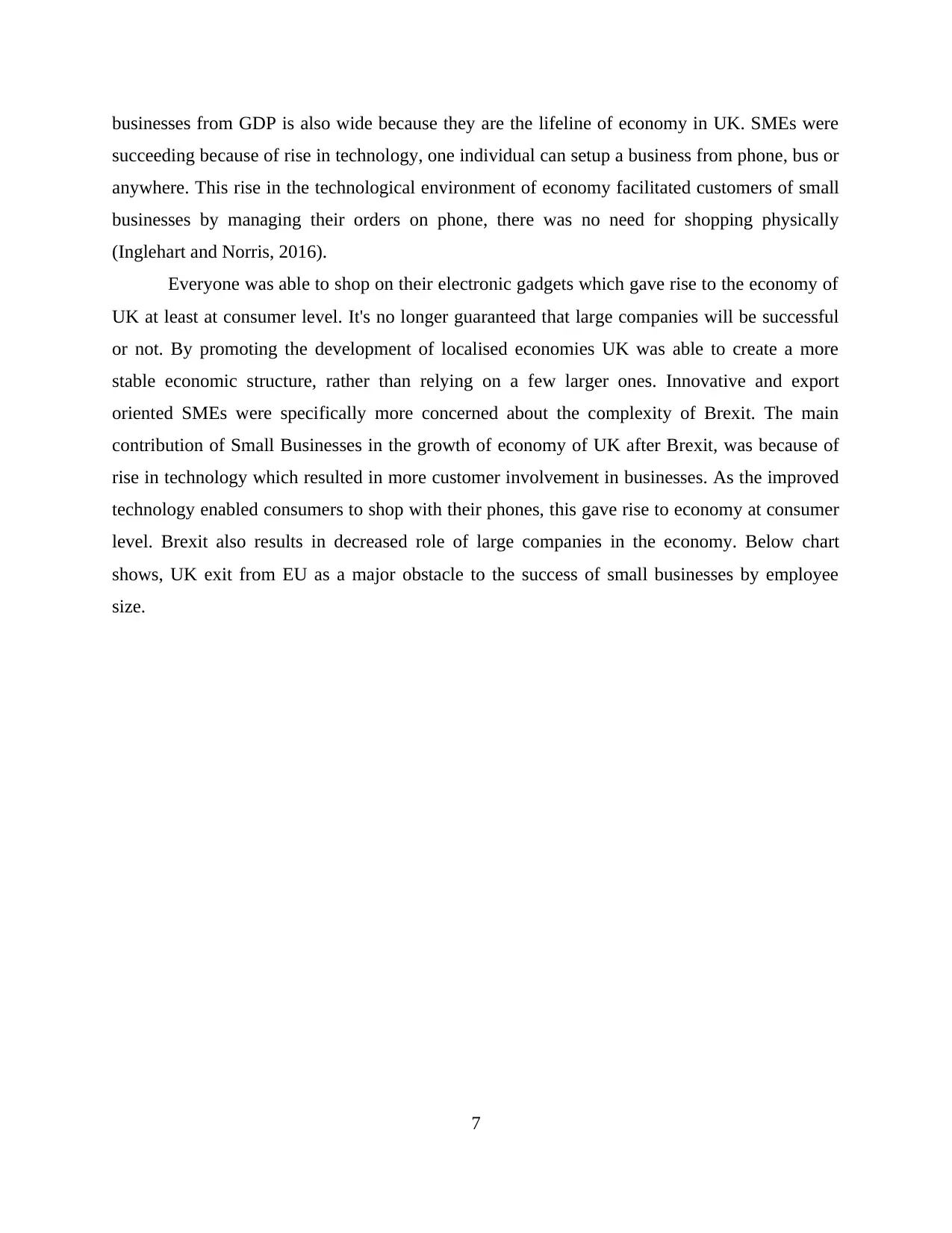
businesses from GDP is also wide because they are the lifeline of economy in UK. SMEs were
succeeding because of rise in technology, one individual can setup a business from phone, bus or
anywhere. This rise in the technological environment of economy facilitated customers of small
businesses by managing their orders on phone, there was no need for shopping physically
(Inglehart and Norris, 2016).
Everyone was able to shop on their electronic gadgets which gave rise to the economy of
UK at least at consumer level. It's no longer guaranteed that large companies will be successful
or not. By promoting the development of localised economies UK was able to create a more
stable economic structure, rather than relying on a few larger ones. Innovative and export
oriented SMEs were specifically more concerned about the complexity of Brexit. The main
contribution of Small Businesses in the growth of economy of UK after Brexit, was because of
rise in technology which resulted in more customer involvement in businesses. As the improved
technology enabled consumers to shop with their phones, this gave rise to economy at consumer
level. Brexit also results in decreased role of large companies in the economy. Below chart
shows, UK exit from EU as a major obstacle to the success of small businesses by employee
size.
7
succeeding because of rise in technology, one individual can setup a business from phone, bus or
anywhere. This rise in the technological environment of economy facilitated customers of small
businesses by managing their orders on phone, there was no need for shopping physically
(Inglehart and Norris, 2016).
Everyone was able to shop on their electronic gadgets which gave rise to the economy of
UK at least at consumer level. It's no longer guaranteed that large companies will be successful
or not. By promoting the development of localised economies UK was able to create a more
stable economic structure, rather than relying on a few larger ones. Innovative and export
oriented SMEs were specifically more concerned about the complexity of Brexit. The main
contribution of Small Businesses in the growth of economy of UK after Brexit, was because of
rise in technology which resulted in more customer involvement in businesses. As the improved
technology enabled consumers to shop with their phones, this gave rise to economy at consumer
level. Brexit also results in decreased role of large companies in the economy. Below chart
shows, UK exit from EU as a major obstacle to the success of small businesses by employee
size.
7
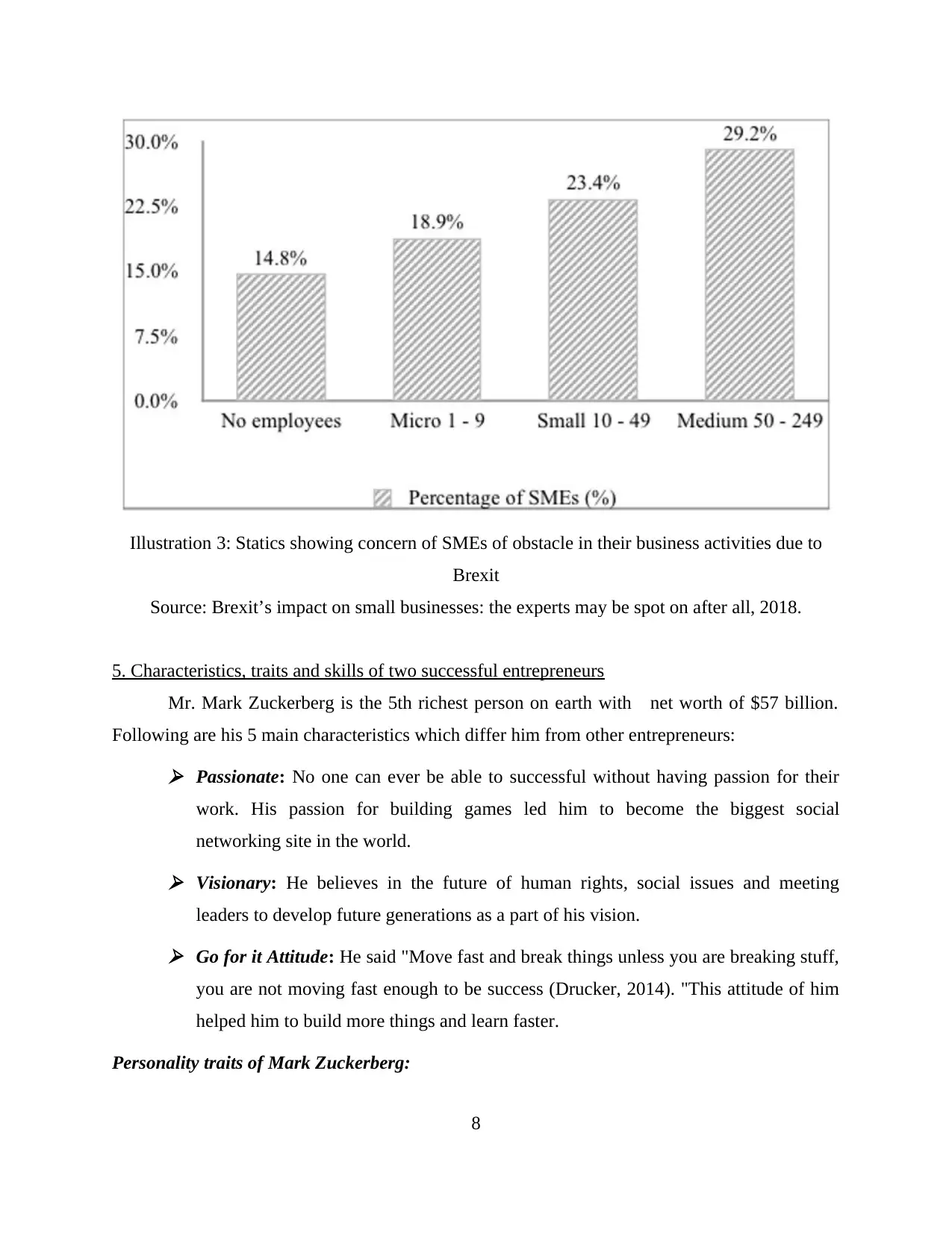
5. Characteristics, traits and skills of two successful entrepreneurs
Mr. Mark Zuckerberg is the 5th richest person on earth with net worth of $57 billion.
Following are his 5 main characteristics which differ him from other entrepreneurs: Passionate: No one can ever be able to successful without having passion for their
work. His passion for building games led him to become the biggest social
networking site in the world. Visionary: He believes in the future of human rights, social issues and meeting
leaders to develop future generations as a part of his vision. Go for it Attitude: He said "Move fast and break things unless you are breaking stuff,
you are not moving fast enough to be success (Drucker, 2014). "This attitude of him
helped him to build more things and learn faster.
Personality traits of Mark Zuckerberg:
8
Illustration 3: Statics showing concern of SMEs of obstacle in their business activities due to
Brexit
Source: Brexit’s impact on small businesses: the experts may be spot on after all, 2018.
Mr. Mark Zuckerberg is the 5th richest person on earth with net worth of $57 billion.
Following are his 5 main characteristics which differ him from other entrepreneurs: Passionate: No one can ever be able to successful without having passion for their
work. His passion for building games led him to become the biggest social
networking site in the world. Visionary: He believes in the future of human rights, social issues and meeting
leaders to develop future generations as a part of his vision. Go for it Attitude: He said "Move fast and break things unless you are breaking stuff,
you are not moving fast enough to be success (Drucker, 2014). "This attitude of him
helped him to build more things and learn faster.
Personality traits of Mark Zuckerberg:
8
Illustration 3: Statics showing concern of SMEs of obstacle in their business activities due to
Brexit
Source: Brexit’s impact on small businesses: the experts may be spot on after all, 2018.
Secure Best Marks with AI Grader
Need help grading? Try our AI Grader for instant feedback on your assignments.
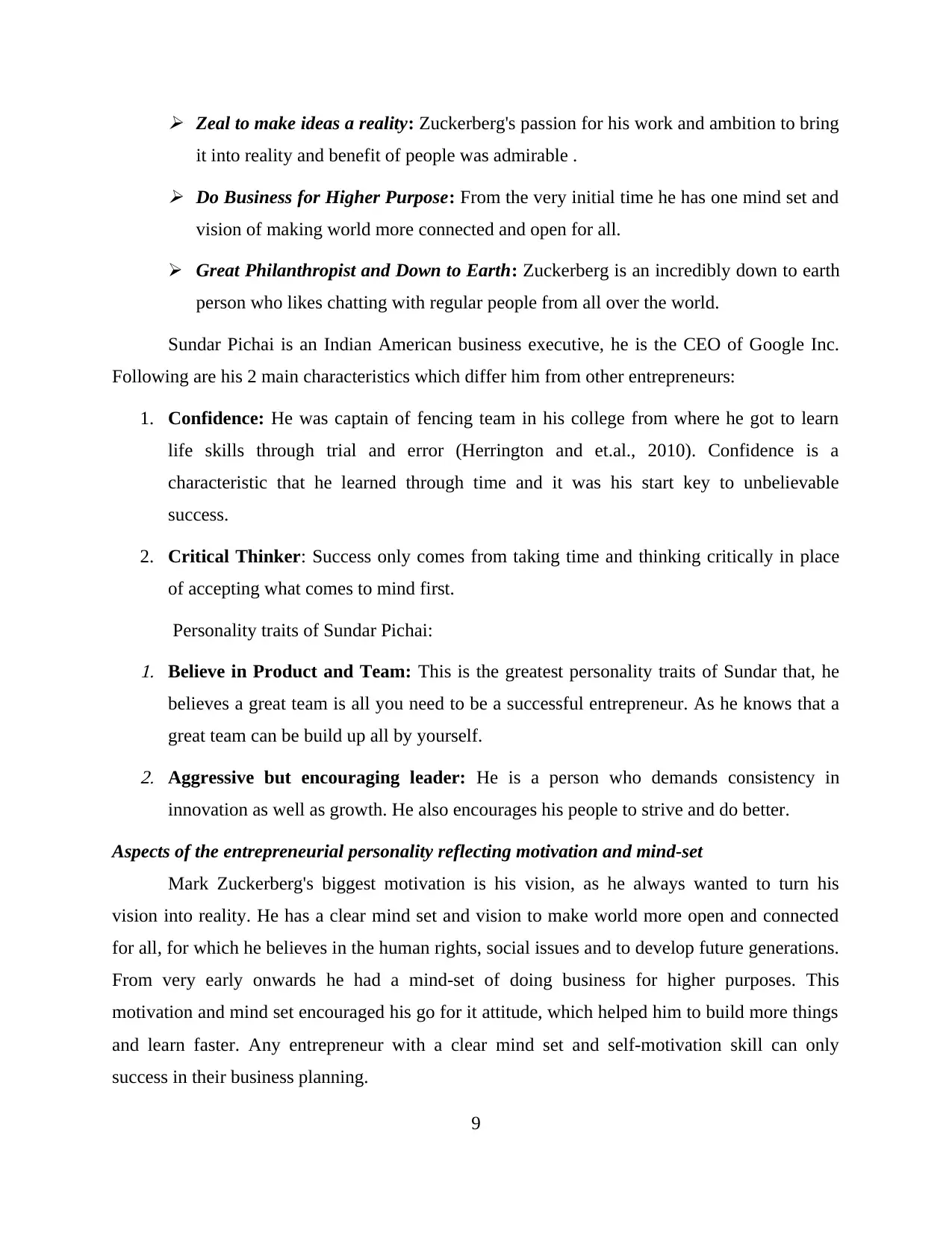
Zeal to make ideas a reality: Zuckerberg's passion for his work and ambition to bring
it into reality and benefit of people was admirable . Do Business for Higher Purpose: From the very initial time he has one mind set and
vision of making world more connected and open for all.
Great Philanthropist and Down to Earth: Zuckerberg is an incredibly down to earth
person who likes chatting with regular people from all over the world.
Sundar Pichai is an Indian American business executive, he is the CEO of Google Inc.
Following are his 2 main characteristics which differ him from other entrepreneurs:
1. Confidence: He was captain of fencing team in his college from where he got to learn
life skills through trial and error (Herrington and et.al., 2010). Confidence is a
characteristic that he learned through time and it was his start key to unbelievable
success.
2. Critical Thinker: Success only comes from taking time and thinking critically in place
of accepting what comes to mind first.
Personality traits of Sundar Pichai:1. Believe in Product and Team: This is the greatest personality traits of Sundar that, he
believes a great team is all you need to be a successful entrepreneur. As he knows that a
great team can be build up all by yourself.2. Aggressive but encouraging leader: He is a person who demands consistency in
innovation as well as growth. He also encourages his people to strive and do better.
Aspects of the entrepreneurial personality reflecting motivation and mind-set
Mark Zuckerberg's biggest motivation is his vision, as he always wanted to turn his
vision into reality. He has a clear mind set and vision to make world more open and connected
for all, for which he believes in the human rights, social issues and to develop future generations.
From very early onwards he had a mind-set of doing business for higher purposes. This
motivation and mind set encouraged his go for it attitude, which helped him to build more things
and learn faster. Any entrepreneur with a clear mind set and self-motivation skill can only
success in their business planning.
9
it into reality and benefit of people was admirable . Do Business for Higher Purpose: From the very initial time he has one mind set and
vision of making world more connected and open for all.
Great Philanthropist and Down to Earth: Zuckerberg is an incredibly down to earth
person who likes chatting with regular people from all over the world.
Sundar Pichai is an Indian American business executive, he is the CEO of Google Inc.
Following are his 2 main characteristics which differ him from other entrepreneurs:
1. Confidence: He was captain of fencing team in his college from where he got to learn
life skills through trial and error (Herrington and et.al., 2010). Confidence is a
characteristic that he learned through time and it was his start key to unbelievable
success.
2. Critical Thinker: Success only comes from taking time and thinking critically in place
of accepting what comes to mind first.
Personality traits of Sundar Pichai:1. Believe in Product and Team: This is the greatest personality traits of Sundar that, he
believes a great team is all you need to be a successful entrepreneur. As he knows that a
great team can be build up all by yourself.2. Aggressive but encouraging leader: He is a person who demands consistency in
innovation as well as growth. He also encourages his people to strive and do better.
Aspects of the entrepreneurial personality reflecting motivation and mind-set
Mark Zuckerberg's biggest motivation is his vision, as he always wanted to turn his
vision into reality. He has a clear mind set and vision to make world more open and connected
for all, for which he believes in the human rights, social issues and to develop future generations.
From very early onwards he had a mind-set of doing business for higher purposes. This
motivation and mind set encouraged his go for it attitude, which helped him to build more things
and learn faster. Any entrepreneur with a clear mind set and self-motivation skill can only
success in their business planning.
9
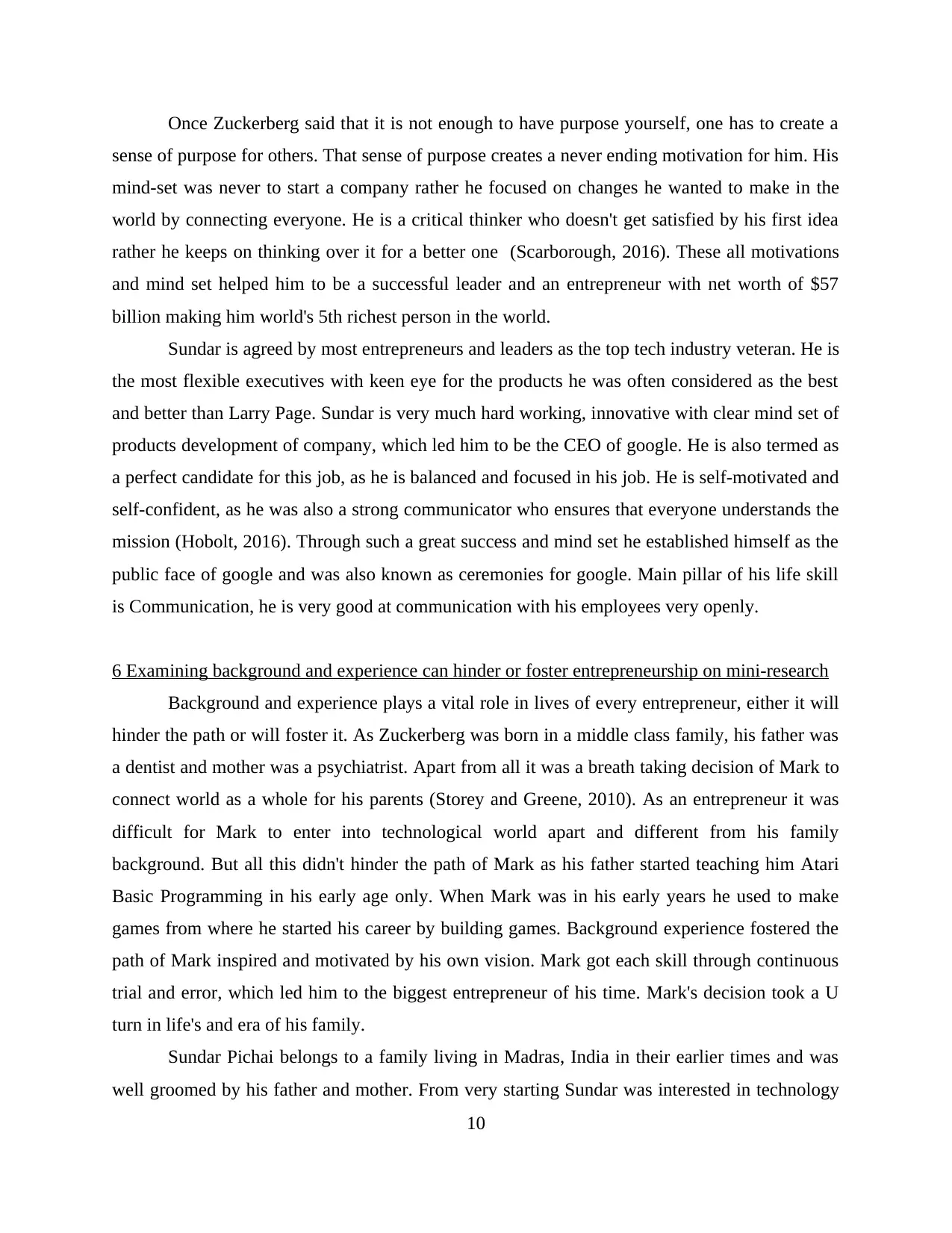
Once Zuckerberg said that it is not enough to have purpose yourself, one has to create a
sense of purpose for others. That sense of purpose creates a never ending motivation for him. His
mind-set was never to start a company rather he focused on changes he wanted to make in the
world by connecting everyone. He is a critical thinker who doesn't get satisfied by his first idea
rather he keeps on thinking over it for a better one (Scarborough, 2016). These all motivations
and mind set helped him to be a successful leader and an entrepreneur with net worth of $57
billion making him world's 5th richest person in the world.
Sundar is agreed by most entrepreneurs and leaders as the top tech industry veteran. He is
the most flexible executives with keen eye for the products he was often considered as the best
and better than Larry Page. Sundar is very much hard working, innovative with clear mind set of
products development of company, which led him to be the CEO of google. He is also termed as
a perfect candidate for this job, as he is balanced and focused in his job. He is self-motivated and
self-confident, as he was also a strong communicator who ensures that everyone understands the
mission (Hobolt, 2016). Through such a great success and mind set he established himself as the
public face of google and was also known as ceremonies for google. Main pillar of his life skill
is Communication, he is very good at communication with his employees very openly.
6 Examining background and experience can hinder or foster entrepreneurship on mini-research
Background and experience plays a vital role in lives of every entrepreneur, either it will
hinder the path or will foster it. As Zuckerberg was born in a middle class family, his father was
a dentist and mother was a psychiatrist. Apart from all it was a breath taking decision of Mark to
connect world as a whole for his parents (Storey and Greene, 2010). As an entrepreneur it was
difficult for Mark to enter into technological world apart and different from his family
background. But all this didn't hinder the path of Mark as his father started teaching him Atari
Basic Programming in his early age only. When Mark was in his early years he used to make
games from where he started his career by building games. Background experience fostered the
path of Mark inspired and motivated by his own vision. Mark got each skill through continuous
trial and error, which led him to the biggest entrepreneur of his time. Mark's decision took a U
turn in life's and era of his family.
Sundar Pichai belongs to a family living in Madras, India in their earlier times and was
well groomed by his father and mother. From very starting Sundar was interested in technology
10
sense of purpose for others. That sense of purpose creates a never ending motivation for him. His
mind-set was never to start a company rather he focused on changes he wanted to make in the
world by connecting everyone. He is a critical thinker who doesn't get satisfied by his first idea
rather he keeps on thinking over it for a better one (Scarborough, 2016). These all motivations
and mind set helped him to be a successful leader and an entrepreneur with net worth of $57
billion making him world's 5th richest person in the world.
Sundar is agreed by most entrepreneurs and leaders as the top tech industry veteran. He is
the most flexible executives with keen eye for the products he was often considered as the best
and better than Larry Page. Sundar is very much hard working, innovative with clear mind set of
products development of company, which led him to be the CEO of google. He is also termed as
a perfect candidate for this job, as he is balanced and focused in his job. He is self-motivated and
self-confident, as he was also a strong communicator who ensures that everyone understands the
mission (Hobolt, 2016). Through such a great success and mind set he established himself as the
public face of google and was also known as ceremonies for google. Main pillar of his life skill
is Communication, he is very good at communication with his employees very openly.
6 Examining background and experience can hinder or foster entrepreneurship on mini-research
Background and experience plays a vital role in lives of every entrepreneur, either it will
hinder the path or will foster it. As Zuckerberg was born in a middle class family, his father was
a dentist and mother was a psychiatrist. Apart from all it was a breath taking decision of Mark to
connect world as a whole for his parents (Storey and Greene, 2010). As an entrepreneur it was
difficult for Mark to enter into technological world apart and different from his family
background. But all this didn't hinder the path of Mark as his father started teaching him Atari
Basic Programming in his early age only. When Mark was in his early years he used to make
games from where he started his career by building games. Background experience fostered the
path of Mark inspired and motivated by his own vision. Mark got each skill through continuous
trial and error, which led him to the biggest entrepreneur of his time. Mark's decision took a U
turn in life's and era of his family.
Sundar Pichai belongs to a family living in Madras, India in their earlier times and was
well groomed by his father and mother. From very starting Sundar was interested in technology
10
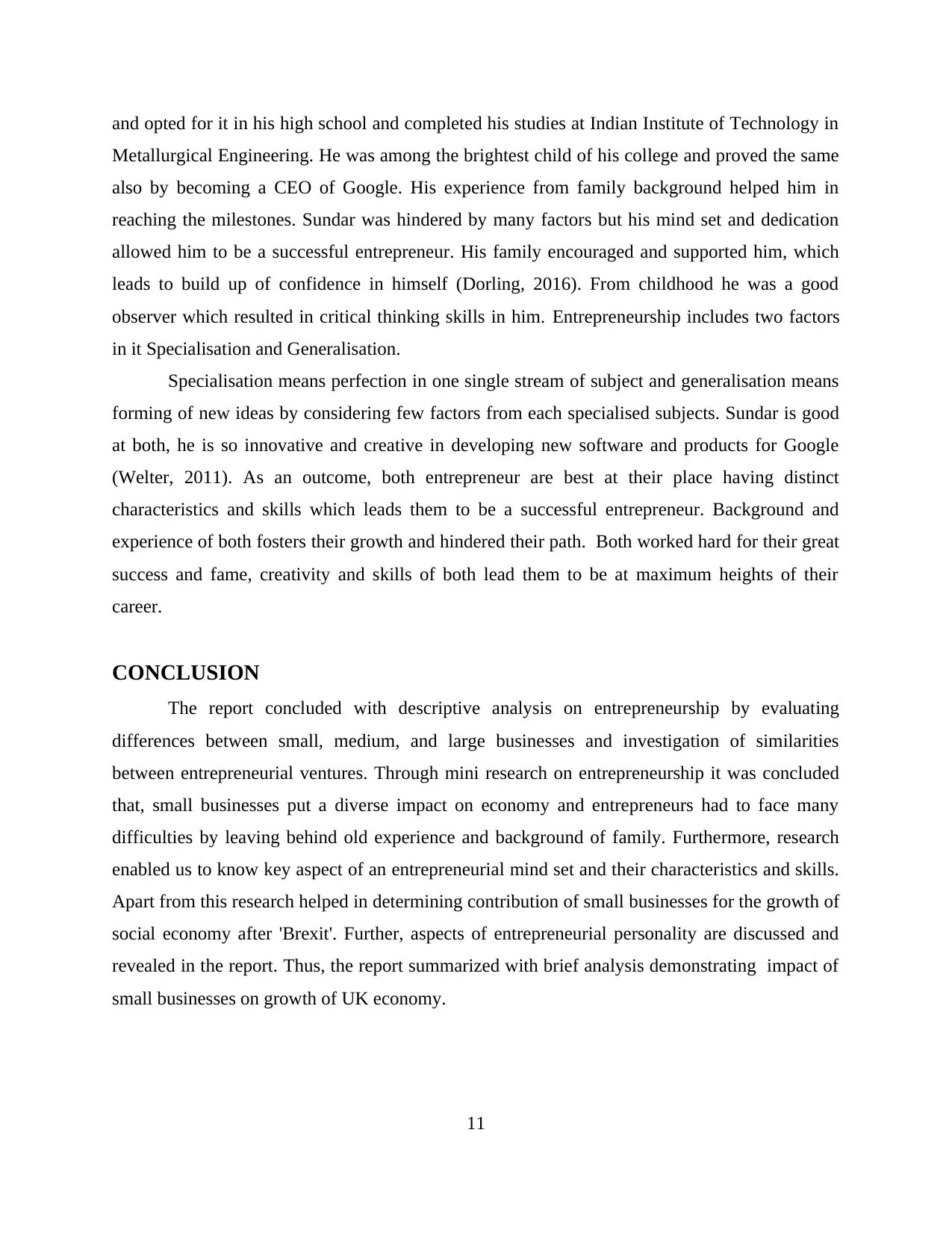
and opted for it in his high school and completed his studies at Indian Institute of Technology in
Metallurgical Engineering. He was among the brightest child of his college and proved the same
also by becoming a CEO of Google. His experience from family background helped him in
reaching the milestones. Sundar was hindered by many factors but his mind set and dedication
allowed him to be a successful entrepreneur. His family encouraged and supported him, which
leads to build up of confidence in himself (Dorling, 2016). From childhood he was a good
observer which resulted in critical thinking skills in him. Entrepreneurship includes two factors
in it Specialisation and Generalisation.
Specialisation means perfection in one single stream of subject and generalisation means
forming of new ideas by considering few factors from each specialised subjects. Sundar is good
at both, he is so innovative and creative in developing new software and products for Google
(Welter, 2011). As an outcome, both entrepreneur are best at their place having distinct
characteristics and skills which leads them to be a successful entrepreneur. Background and
experience of both fosters their growth and hindered their path. Both worked hard for their great
success and fame, creativity and skills of both lead them to be at maximum heights of their
career.
CONCLUSION
The report concluded with descriptive analysis on entrepreneurship by evaluating
differences between small, medium, and large businesses and investigation of similarities
between entrepreneurial ventures. Through mini research on entrepreneurship it was concluded
that, small businesses put a diverse impact on economy and entrepreneurs had to face many
difficulties by leaving behind old experience and background of family. Furthermore, research
enabled us to know key aspect of an entrepreneurial mind set and their characteristics and skills.
Apart from this research helped in determining contribution of small businesses for the growth of
social economy after 'Brexit'. Further, aspects of entrepreneurial personality are discussed and
revealed in the report. Thus, the report summarized with brief analysis demonstrating impact of
small businesses on growth of UK economy.
11
Metallurgical Engineering. He was among the brightest child of his college and proved the same
also by becoming a CEO of Google. His experience from family background helped him in
reaching the milestones. Sundar was hindered by many factors but his mind set and dedication
allowed him to be a successful entrepreneur. His family encouraged and supported him, which
leads to build up of confidence in himself (Dorling, 2016). From childhood he was a good
observer which resulted in critical thinking skills in him. Entrepreneurship includes two factors
in it Specialisation and Generalisation.
Specialisation means perfection in one single stream of subject and generalisation means
forming of new ideas by considering few factors from each specialised subjects. Sundar is good
at both, he is so innovative and creative in developing new software and products for Google
(Welter, 2011). As an outcome, both entrepreneur are best at their place having distinct
characteristics and skills which leads them to be a successful entrepreneur. Background and
experience of both fosters their growth and hindered their path. Both worked hard for their great
success and fame, creativity and skills of both lead them to be at maximum heights of their
career.
CONCLUSION
The report concluded with descriptive analysis on entrepreneurship by evaluating
differences between small, medium, and large businesses and investigation of similarities
between entrepreneurial ventures. Through mini research on entrepreneurship it was concluded
that, small businesses put a diverse impact on economy and entrepreneurs had to face many
difficulties by leaving behind old experience and background of family. Furthermore, research
enabled us to know key aspect of an entrepreneurial mind set and their characteristics and skills.
Apart from this research helped in determining contribution of small businesses for the growth of
social economy after 'Brexit'. Further, aspects of entrepreneurial personality are discussed and
revealed in the report. Thus, the report summarized with brief analysis demonstrating impact of
small businesses on growth of UK economy.
11
Paraphrase This Document
Need a fresh take? Get an instant paraphrase of this document with our AI Paraphraser

12
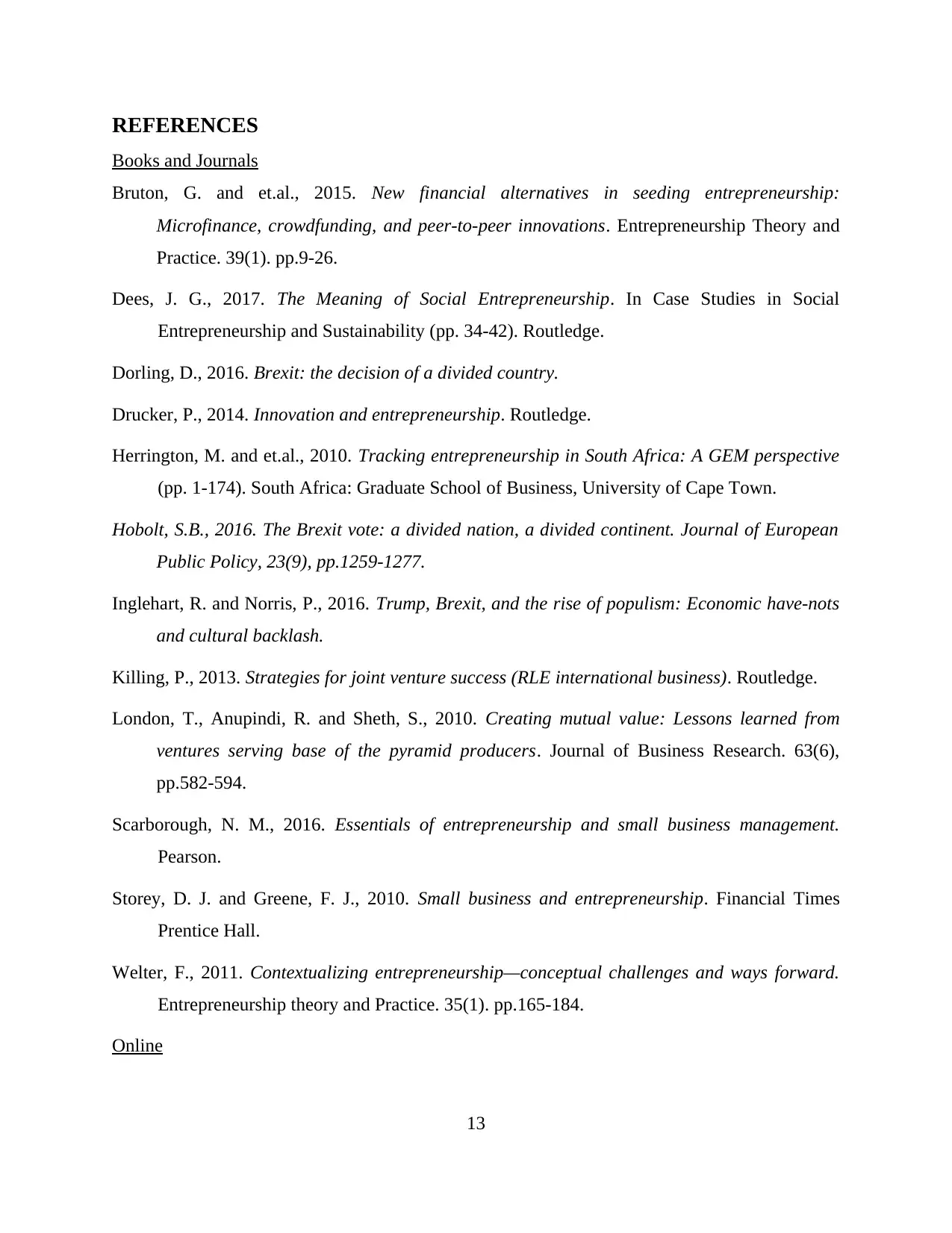
REFERENCES
Books and Journals
Bruton, G. and et.al., 2015. New financial alternatives in seeding entrepreneurship:
Microfinance, crowdfunding, and peer‐to‐peer innovations. Entrepreneurship Theory and
Practice. 39(1). pp.9-26.
Dees, J. G., 2017. The Meaning of Social Entrepreneurship. In Case Studies in Social
Entrepreneurship and Sustainability (pp. 34-42). Routledge.
Dorling, D., 2016. Brexit: the decision of a divided country.
Drucker, P., 2014. Innovation and entrepreneurship. Routledge.
Herrington, M. and et.al., 2010. Tracking entrepreneurship in South Africa: A GEM perspective
(pp. 1-174). South Africa: Graduate School of Business, University of Cape Town.
Hobolt, S.B., 2016. The Brexit vote: a divided nation, a divided continent. Journal of European
Public Policy, 23(9), pp.1259-1277.
Inglehart, R. and Norris, P., 2016. Trump, Brexit, and the rise of populism: Economic have-nots
and cultural backlash.
Killing, P., 2013. Strategies for joint venture success (RLE international business). Routledge.
London, T., Anupindi, R. and Sheth, S., 2010. Creating mutual value: Lessons learned from
ventures serving base of the pyramid producers. Journal of Business Research. 63(6),
pp.582-594.
Scarborough, N. M., 2016. Essentials of entrepreneurship and small business management.
Pearson.
Storey, D. J. and Greene, F. J., 2010. Small business and entrepreneurship. Financial Times
Prentice Hall.
Welter, F., 2011. Contextualizing entrepreneurship—conceptual challenges and ways forward.
Entrepreneurship theory and Practice. 35(1). pp.165-184.
Online
13
Books and Journals
Bruton, G. and et.al., 2015. New financial alternatives in seeding entrepreneurship:
Microfinance, crowdfunding, and peer‐to‐peer innovations. Entrepreneurship Theory and
Practice. 39(1). pp.9-26.
Dees, J. G., 2017. The Meaning of Social Entrepreneurship. In Case Studies in Social
Entrepreneurship and Sustainability (pp. 34-42). Routledge.
Dorling, D., 2016. Brexit: the decision of a divided country.
Drucker, P., 2014. Innovation and entrepreneurship. Routledge.
Herrington, M. and et.al., 2010. Tracking entrepreneurship in South Africa: A GEM perspective
(pp. 1-174). South Africa: Graduate School of Business, University of Cape Town.
Hobolt, S.B., 2016. The Brexit vote: a divided nation, a divided continent. Journal of European
Public Policy, 23(9), pp.1259-1277.
Inglehart, R. and Norris, P., 2016. Trump, Brexit, and the rise of populism: Economic have-nots
and cultural backlash.
Killing, P., 2013. Strategies for joint venture success (RLE international business). Routledge.
London, T., Anupindi, R. and Sheth, S., 2010. Creating mutual value: Lessons learned from
ventures serving base of the pyramid producers. Journal of Business Research. 63(6),
pp.582-594.
Scarborough, N. M., 2016. Essentials of entrepreneurship and small business management.
Pearson.
Storey, D. J. and Greene, F. J., 2010. Small business and entrepreneurship. Financial Times
Prentice Hall.
Welter, F., 2011. Contextualizing entrepreneurship—conceptual challenges and ways forward.
Entrepreneurship theory and Practice. 35(1). pp.165-184.
Online
13
1 out of 15
Related Documents
Your All-in-One AI-Powered Toolkit for Academic Success.
+13062052269
info@desklib.com
Available 24*7 on WhatsApp / Email
![[object Object]](/_next/static/media/star-bottom.7253800d.svg)
Unlock your academic potential
© 2024 | Zucol Services PVT LTD | All rights reserved.





